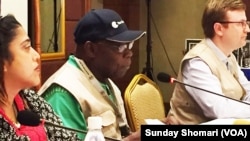The rebuilding of northeast Nigeria communities destroyed during the seven-year insurgency of Boko Haram terrorists will take a long time, but improvements are being made, former President Olusegun Obasanjo says.
The Nigerian military has dislodged Boko Haram from many of its strongholds in recent years, and more than 1 million displaced persons are now returning home. Obasanjo, interviewed on VOA's "Africa News Tonight," said he saw hope for the region after his recent visit to the capital of the northeastern state of Borno.
”About two weeks ago," he said, "I was in Maiduguri, which is, if you like, the epicenter of Boko Haram, just to see for myself what exactly is going on. I think compared with what I saw when I went there in 2011, there’s a marked improvement. That city has taken a new shape, a new life.”
Five years ago, Obasanjo said, any visitor could see upon arrival that he was in a war zone, but "that is not the case today, and the governor proudly told me that we are now rehabilitating internally displaced persons. His ambition is by the end of this year, there will be no internally displaced person in any camp. The military informed me the morale of the soldiers is very high.”
The former president said that while the military appeared to have retaken territory from Boko Haram, there's still work to be done to re-establish peace and stability. Much of that work involves providing support for the area’s most vulnerable and those hardest hit by Boko Haram: women and children.
Obasanjo said that once the military has secured a particular area, the state government encourages women to return home and rebuild their lives.
“The governor has decided the women will have their livestock," he said. "They will supply them with livestock — goats and sheep. Fortunately, there are no land mines in the fields. So schools will be opened. Health centers and clinics will be opened. From what I heard and saw — from the ordinary people, from the military and from the state administration — I am certain that we are about to see the light beyond the tunnel.”
Obasnajo acknowledged that rebuilding the region's infrastructure, plus health and other social services, would require a long-term effort. As an example, he contended that it takes 10 years for investments in education to yield results.
The former president urged the international community to help guarantee a secure, stable future for Nigeria’s shattered northeast.




